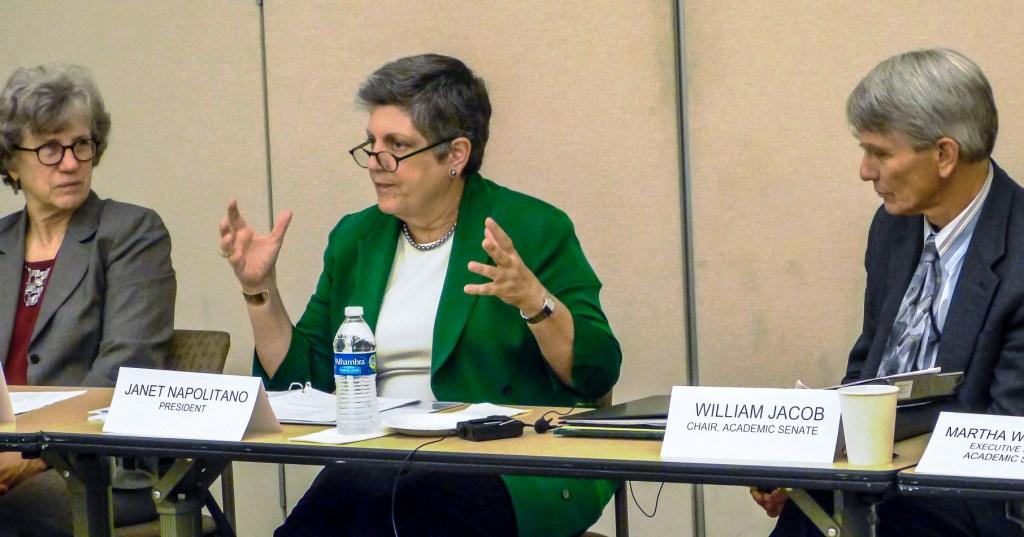November 2013
Academic Council Welcomes President Napolitano
 |
President Janet Napolitano with Provost Dorr and Senate Chair Jacob at the October 23, 2013 Academic Council meeting |
At her first meeting with the Academic Council on October 23, UC President Janet Napolitano wasted no time engaging the faculty in shared governance when she asked the Senate to work with the administration on a strategy for addressing racial bias and discrimination on the campuses.
Although the Council had expected to engage the new President in a discussion of three of the Senate’s highest priorities—enrollment management, educational quality, and faculty quality—the issue of the day was a report from a five-member panel headed by former California Supreme Court Justice Carlos Moreno addressing complaints of racial bias and discrimination affecting UCLA faculty.
The “Moreno Report,” which was released on October 15, was commissioned by UCLA Chancellor Block last year to investigate claims by faculty members of color there. It makes several recommendations for institutional policy reform.
President Napolitano called for the formation of a Senate-Administration working group to respond to the recommendations in the Moreno Report, focusing onlocal processes for bringing, collecting and investigating complaints and imposing sanctions; how the UC system should respond to the three major recommendations of the report; and ways to improve the faculty diversity pipeline.
The President made it clear that she is very troubled by the report.
“The Moreno Report is a clarion call to look at ourselves and deal with the issues more thoroughly than in the past,” she said. “There is a crisis in how we deal with allegations of discrimination and the culture from which they emerge–the way we treat each other on campuses, the kind of language we use, and the actions and consequences, both for the victim and the perpetrator. We have a challenge before us. This is something we need to get right.”
The President said she views the issues cited in the report as a systemwide problem requiring a systemwide approach. As such, she has asked all ten Chancellors and the systemwide Senate to respond to the issues and recommendations raised in the report and to evaluate all related policies, including APM 015 (the Faculty Code of Conduct), and divisional procedures overseen by the Senate committees on Privilege and Tenure.
“Right now the campus systems are all over the place,” she said.
Council members echoed these concerns and expressed a strong desire to look carefully at existing accountability systems to ensure that faculty have avenues to express complaints, and that meaningful consequences exist in response to such incidents.
“This is a critical issue that will require the Senate and administration to work together,” said Academic Council Chair Jacob. “Every division chair should work with his or her Chancellor to review campus policies and procedures, and I will also ask for advice from expert systemwide committees, including UCAAD, UCAP and UCP&T.”
Council members also noted the need to make diversity a value among the entire faculty and cited examples of efforts on specific campuses to ensure that networks of mentoring support and encouragement exist, and that awareness of diversity and equity is present in all stages of recruitment, hiring, promotion, and retention. Provost Dorr offered to compile recent efforts in this area, including campus salary equity plans, the implementation of APM 210.1-d, which recognizes contributions to diversity in merit and promotion cases, and the recommendations of the President’s Advisory Council on Campus Climate, Culture and Inclusion. These efforts can serve as a basis for discussion and as a source of best practices that already exist on some campuses.
 |
Academic Council members, Senior Administrators, and President Janet Napolitano at the October 23, 2013 Academic Council meeting |
Senate Chair Jacob emphasized that the President has a standing invitation to attend Academic Council meetings, and expects the Council to engage her in the near future in an introductory discussion of the Senate’s highest priorities.
In addition, the President began a “listening and learning” tour of UC campuses the week after she arrived at UCOP on September 30. Each visit has included sessions with faculty and Senate leadership. Each Senate was invited to prepare a short briefing document for the president outlining the Senate’s view of the highest priority campus and systemwide issues.
UCSD Senate Chair Kit Pogliano notes, “The President was very engaged and interested in hearing the faculty voice throughout her visit. She had clearly read our briefing document and looked into several of our critical comments. She asked excellent follow-up questions. She specifically asked for our vision of priorities for UCOP and we were politely forthright in presenting our views. I found her to be very receptive to different points of view and motivated to hear both strengths and weaknesses.”
President Napolitano noted that the opportunity to lead the largest, most prestigious public university in the nation was too good to pass up.
“My passion is education,” she said. “I feel like I’m returning to my roots and where I want to invest in my energies.”
She said as governor of Arizona from 2003 to 2009, she fought for higher education in a state with a similar youthful and diverse population. Her experience as the Secretary of Homeland Security, a department with 22 agencies, many of which have their own heads, is similar in structure to UC with its president, ten Chancellors, and three national laboratories.
The President is expected to complete her campus tours by the end of November.
